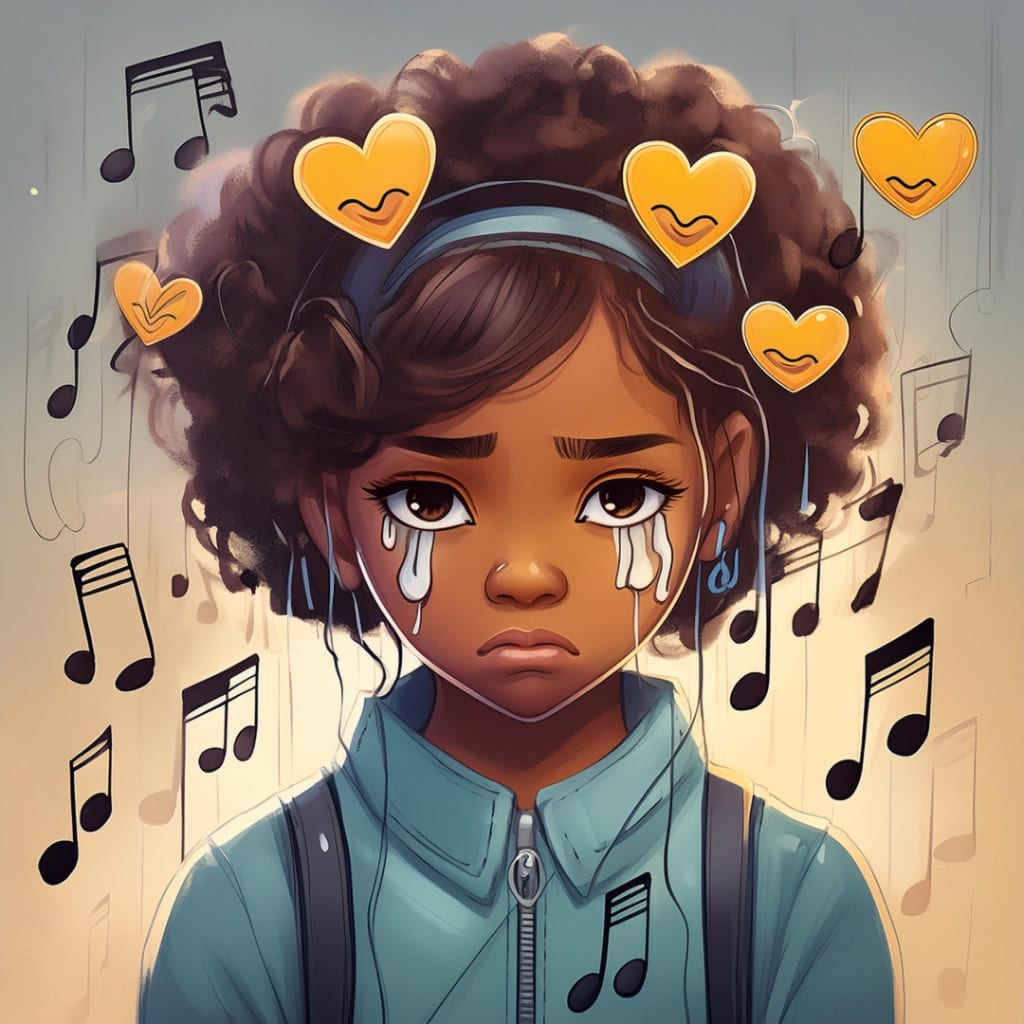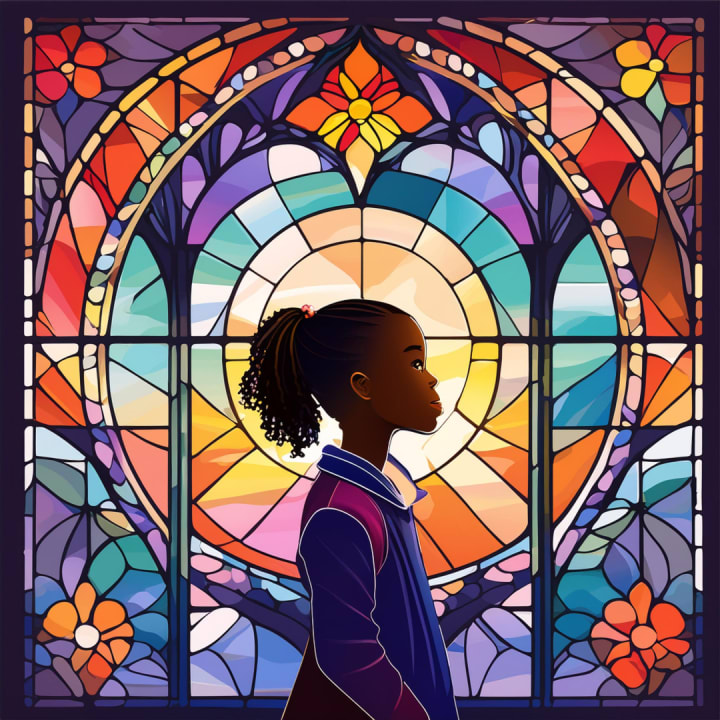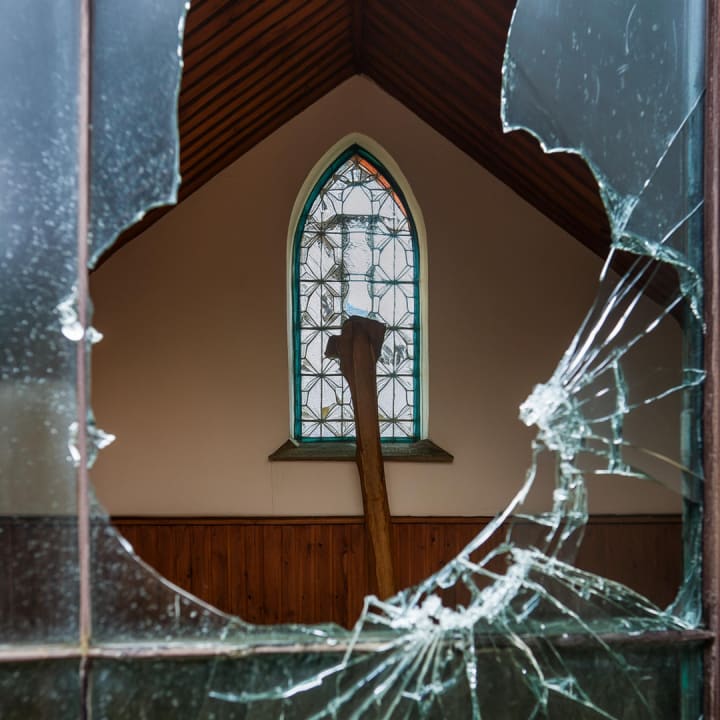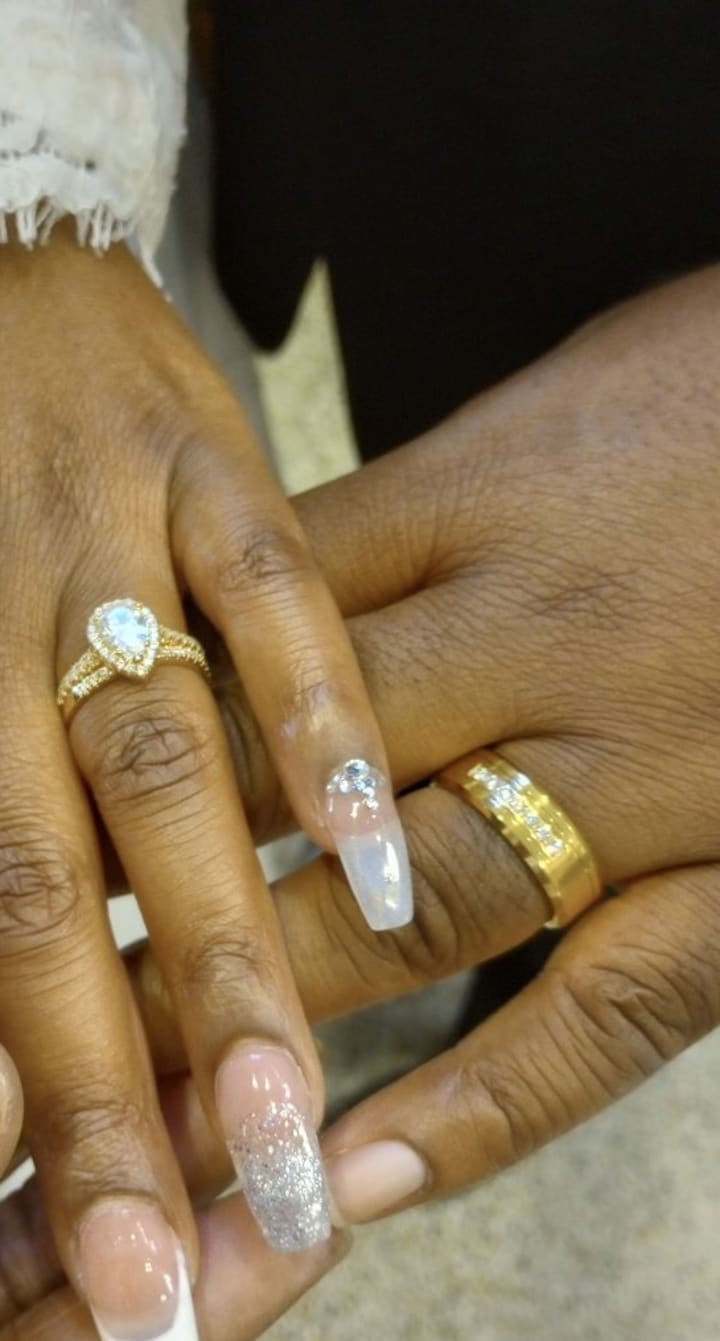Whispers Of Resilience
The Ballads of Lilly's Voice

Once in a small town, there was a young girl named Lily, the preacher’s daughter. Her life was a stained glass window; it was meant to shine brightly, but a dark shadow had been cast upon it. At the tender age of nine, her innocence was marred by a trusted church member. Trust, once boundless and eternal like the horizon, was shattered into a mosaic of fear and silence.
After the incident, Lily was swathed in a veil of muteness that parted only for whispers to herself or to the stars that seemed to be the only listeners left. She cloaked herself in solitude, her voice imprisoned by the fortress of her trauma.
The townspeople, even her own congregation, whispered about the preacher’s kid who wouldn’t speak. Was it rebellion? Was it a cry for help? What they saw as defiance, was Lily’s struggle with selective mutism — a mind’s desperate attempt to protect itself from further harm.
As Lily grew, her internal turmoil did too. The girl that used to hum hymns in the pews now thrummed with an anger that she could not express with words. It manifested in her fists and in her feet; it took her from the playground to the principals’ offices to the juvenile detention centers. Behind bars, the humming stopped altogether, and the darkness of her cell seemed a fit comparison for the confines of her psyche.
Lying on her cot, Lily battled invisible enemies. Her night was tormented with flashbacks, where the ghost of touch and the echo of a broken trust played itself over and over like a scratched record. She woke to the jingle of keys and the stale air of confinement, wrestling with an identity that felt like a tattered patchwork — she was the preacher’s kid, the victim, the silent girl, the rebel.
But within the dull brick and metal of her confinement, a seed of transformation was sown. A counselor came into Lily’s life — Ms. Frierson, a soft-spoken woman with eyes that didn’t look at Lily in fear or judgment, but with understanding. Ms. Frierson shared stories of her own, of people she knew, tales of those who had been broken but had spun their pain into threads of resilience.

Slowly, Lily started speaking. First through nods and shakes of her head, then through words scribbled on the back of a math worksheet, until, like a spring after a long winter, her voice began to thaw and trickle out. It was a low and rusty sound at first, but with each word spoken, the timbre became firmer, more certain.
Through uncounted sessions and shared stories, Ms. Frierson helped Lily understand that her identity was not a fixed picture, but a canvas on which she had the power to paint anew. She could hold the brush of her life, mixing the dark colors of her past with brighter hues of her own choosing.
It was not a swift transformation, for healing is seldom a sprint, but a marathon. Yet, over time, Lily became a champion for others like her. Her story — a confession of hurt but also a proclamation of survival — began to mend the fractures in her world.
Years have passed, and though her journey is far from over, Lily stands before her father’s congregation not in shame, but in triumph. Her voice, clear and resonant, speaks of suffering but also of hope, of battles fought and slowly won. The whispering ceased, replaced by listening and a shared recognition of the profound strength of the human spirit.
Lily learned that her narrative was hers to tell, a story shaped not by one moment in the gloom of her past but by the countless moments of courage that led her into the light.
As the congregation watched Lily find her voice, they failed to see the tremors within. The very same men who whispered amens sprawled out in pews were ghosts that haunted her, mirrors reflecting her father — the preacher who served Sunday sermons and weeknight terrors. Lily loathed him, the man who should have been her protector but became the architect of her desolation.
Every gaze from a man was a potential threat. She crafted a fortress from fabric, shrouding her femininity in shadows, a silent rebellion against the vulnerability she saw in her mother. Her mother, a kind but broken woman, who had been twisted and bent by the preacher’s cruel manipulations. “Never,” Lily swore to herself, “will I be plucked and played like she was.”
In this repulsion, she found solace in the company of women — their presence didn’t send shivers down her spine. They were safe harbors in a churning sea. Their camaraderie, their strength — traits she admired and emulated.
Yet, for all the anger and confusion that churned within her, Lily was tethered still by faith. It was a complicated relationship, for how could one not question a deity that ordained her birthright as the preacher’s daughter? The very word ‘God’ was a paradox in her mouth: a taste of solace and sourness.
But she felt it, the undeniable pull of something higher. She saw glimpses of divine love in Ms. Frierson patience, in the unfurling petals of flowers that reached for the light in spite of the cold, in her own heartbeat that drummed the rhythm of human persistence. “God,” she thought, “if You are up there, You know pain. You must know healing too.”
She held onto hope like a flickering candle in a tempest, believing that there must be a plan for her, a path she was yet to tread that would lead her away from the angst-riddled jungles of her youth. She held onto the belief that one day her heart would mend, that trust — pure and sacred — could be realized again, that she could forgive the preacher and release the burden of hatred that weighed heavily upon her.
And then, the unexpected unfolded — like the beginning of a new chapter that starts mid-sentence without a forewarning.

One evening, during a service, a man walked into the church. He was not like the others; he was warm, genuine, and there was a sorrow in his eyes that spoke of his own tales of loss. He listened to Lily’s testimony, her voice a lighthouse to his shipwrecked soul. Moved by her strength, he approached her, not with words, but with a poem he had written — a written embrace to her spirit.
This man, Adrian, asked for nothing but to share in the appreciation of faith and healing. Their friendship blossomed slowly, petals of trust opening in the light of their shared understanding. Lily, cautious yet curious, began to explore a different kind of kinship with Adrian, one that taught her men could be more than the shadows of her past.
Her journey to reconcile with the masculine was an odyssey fraught with old fears and new discoveries. The black and white of her world blurred, and she saw color in places once starkly monochrome.
In this unexpected twist, Lily found that perhaps God’s healing came in forms she never anticipated. In the acceptance of Adrian’s friendship, Lily realized her own heart’s capacity for forgiveness and the courage to confront the wounds her father had left. She discovered that to be vulnerable was not to be weak, but brave in the face of one’s own humanity.
As days melted into weeks, and weeks into months, Lily and Adrian’s bond solidified into something that neither words nor verses could fully encase. A silent language of glances and gestures developed, carrying conversations full of meaning and understanding. Her laughter became less rare, and her silences spoke not of emptiness, but of comfort and contemplation.
Often, they would sit by the riverside, talking about everything and nothing, the water’s flowing cadence a soothing backdrop to their shared solitude. Adrian never pressed Lily to speak of her past, yet he remained an ever-present listener, should the desire to share grip her with urgency.
One crisp autumn afternoon, as auburn leaves danced their descent around them, Lily surprised herself. With little prelude, she began to unravel her past before Adrian, starting at the very threads that had entwined her in silence. The fear, the betrayal, the tumultuous anger — all unfurled.
Adrian listened — a sentinel in the wake of her storm. As her tale wound down, he saw the sunrise after a decade of night rise in her eyes. It was a moment of raw vulnerability, but in that exposure lay a shared strength.
There, in the ebbing light of day, Adrian revealed his own tapestry of pain, weaved with loss and journeys through grief’s shadowed valleys. Lily listened, her heart a quiet drumbeat in tune with his words. It was a mutual offering of their brokenness, a foundation for healing not just as individuals but together.
Together, they discovered that the cure for past wounds wasn’t isolation but the communion of souls. They learned that faith could be rekindled and remolded by genuine human connections, rather than the hollow echoes of ritual and expectation.
In this light, Lily’s relationship with God began to shift. The deity she had feared and revered from a distance now seemed closer, a presence found in the hands that held hers through darkness, in the voices that guided her towards self-forgiveness, in the mirrored pain of another that offered not judgment but camaraderie.
And so, Lily’s journey of redemption continued, punctuated by chapters of revelation, acceptance, and unguarded emotions. Each step forward on her path to healing inscribed itself upon her heart and soul, a perpetual testament to the transformative power of shared grief, resilience, and love.
As Lily walked beside Adrian, a man whose company she found comfort and acceptance in, there were still shadows that loomed within her — the insidious echoes of a cursed legacy she feared inheriting. A counselor from her troubled youth had once carelessly remarked that the abused often become abusers. That notion haunted her like a specter at the edge of her consciousness, whispering vile prophecies of a future she desperately sought to avoid.
The whispers sometimes grew into roars, the devil’s insidious voice telling her she was corrupt at the core, a pervert — destined to become what she despised. Sleepless nights were filled with cold sweats as she batted away the tormenting thoughts, terrified of a darkness within that might one day wake and consume her.
The weight of her fears was a chain around her heart, each link forged from the sins of her father, as though his transgressions had been passed down like an unwanted inheritance, a birthright of pain and self-loathing. She fought the belief that his sins doomed her to a life devoid of love, joy, or purity.
And yet, despite the whirlpool of fear and doubt, Lily’s spirit refused to be fully quenched. In the light of day, with the sounds of life bustling around her, she clung to hope as a lifeline. Adrian, ever patient and understanding, reminded her through his unwavering presence that she was not alone in her battle.

One day, reflecting on her tumultuous feelings, Lily decided to confront them head-on. Sitting across from her father in the very church where nothing should have been hidden, but so much was, she poured out her fear, anger, and sorrow. It was a cathartic eruption of every emotion she had imprisoned, a declaration that she would not be defined by her lineage or constrained by the label of victimhood.
“I am not you,” she asserted, her voice steady, though her body trembled. “I am not a curse, nor am I cursed. Your sins are yours alone to atone for. I am reclaimable. I am worthy of love, and I banish this fearful narrative from my life.”
Shaking but liberated, Lily left the church, leaving behind the dark cloak of her father’s shadow. She had spoken her truth, setting herself free from the chains of a supposed destiny.
In the weeks that followed, Lily took another courageous step; she began to work with a new counselor, one who helped her navigate the tangle of her PTSD and reinforced the truth that her future was not written in the sins of her father. With professional guidance, Lily gradually learned to dismantle the lies embedded in her psyche, reaffirming her true identity as a woman capable of love, compassion, and kindness — everything her father was not.
Talking of curses and feeling such heavy burdens lifted, Lily realized that she did not carry her family’s woes — she carried a story of survival, a tale that might inspire others to break free from the whispers that sought to bind them.
Surrounded by people like Adrian and her new counselor, Lily began to envision a life unfettered by her past. She dreamed of marriage, not as a far-off hope, but as a real possibility — a union grounded not in fear, but in the honest and beautiful complexities of two souls intertwining.
“There is no curse, only the one we place upon ourselves,” she whispered one evening, a newfound mantra of empowerment. With that revelation, she stepped forward into her unwritten chapters, shedding the haunting whispers and embracing the promises of a newfound dawn.
Embracing her newfound perspective, Lily’s life became a pilgrimage, each step forward a milestone away from her old fears and towards the person she yearned to be. The church, once a place of shadows, slowly transformed back into one of sanctuary, not just for worship, but for making peace with her past.
She found solace in volunteer work, channeling her experiences into empowering others. Women and children who faced their own dark nights gathered courage from Lily’s openness, her willingness to testify that the past did not have to determine the future.
Adrian, who had become her closest ally, was a testament to the healing power of friendship. He never pushed her to explore what she wasn’t ready to face, but when she did, he was the anchor that kept her from drifting too far into the treacherous tides of her own mind.
As autumn waned and winter’s chill took its hold, the inner warmth that Lily nurtured within herself grew. She realized that the love she had for Adrian was deepening, no longer just platonic but something richer, tender and filled with potential. He had been her confidant, her friend, and now, perhaps, he could be something more.
She had confessed her feelings to him one evening, under a cathedral of stars that stretched endlessly above them. In that moment, her heart felt as vast as the sky — capacious and brave.
“The scars we carry chose us without our permission,” she told him, her voice threading through the quiet night. “But I choose you, with all my heart.”
Adrian, with his poetic soul, smiled softly, a reflection of his soul’s gentle nature. “And I, you,” he said. “Together, we can write a story that’s ours alone — free from the bindings of yesteryears.”
Together, they started to build a life, each moment its own chapter. They nurtured love, cultivated trust, and together they learned that brokenness was not the same as destruction; it was an opportunity for reconstruction, for creating something new and beautiful from the pieces.
The whispers of the devil that once hissed at the edges of Lily’s consciousness had quieted, overshadowed by the chorus of love and support that now surrounded her. She sometimes wondered how her younger self could ever have thought her spirit would be forever crippled by her father’s transgressions.
The answer lay in the journey she had embarked upon — not just to escape the suffocating legacy of her father but to discover the vast expanse of her own soul; a soul capable of enduring love, of compassion that reached beyond the grips of trauma, and of a strength that resonated with the purity of her intentions.
Life was not without its challenges, and old fears sometimes resurfaced like specters in a play, but now Lily had an ensemble to help face them. Rather than fight alone, she leaned on Adrian, on friends who became family, on a community that had learned as much from her as she had from them.
As the years passed, Lily became not just a survivor, but a beacon of hope. The idea that she once thought herself cursed seemed like a tale from another life. The whispers of condemnation were now replaced with affirmations of her worth, her capacity for change, and her ability to love deeply and be loved in return.
The young girl who once suffered in silence now stood before her community and beside the man she loved, a living proof that the chains of the past could be broken. She was not her father’s daughter in spirit — she was her own woman, strong, healed, and whole.
And in a world that was forever imperfect, Lily’s journey echoed the quiet triumph of humanity — the perseverance of the heart, the redemption found in every willing step away from darkness toward an ever-possible light.
As spring heralded new beginnings, Lily and Adrian announced their union, a testament to love’s indefatigable spirit. Yet whispers, not of the devil this time, but of envy, wound their way through the Paula family. Her siblings, aunts, and uncles harbored a bitterness that was as old as the vines on the church walls, thick with the belief that a mark of sin was etched into her very being. Their jealousy tarnished their ability to appreciate Lily’s happiness, for they had been convinced by the old adage of blemished blood carried through generations.
“The Paula stain,” they called it behind closed doors — a phantom mark they thought would render her undeserving of pure love or matrimonial bliss. But love, as boundless as the heavens, cared little for such superstitions.
The wedding was a humble affair, but it was graced with an undeniable aura of enchantment. Lily, in a gown of soft ivory that whispered along the floor as she walked down the aisle, was a visage of the strength and tranquility. Adrian stood at the end, eyes brimming, not with the poetry he often penned, but with a love so powerful and sincere that words seemed superfluous.
They exchanged vows beneath the same stained glass that had witnessed Lily’s darkest and most triumphant moments. And in their promise, a silent vow echoed — a commitment to challenge the legacy of fear and sorrow that had haunted the Paula lineage.
Murmurs of dissent were hushed by the undeniable aura of change that the couple exuded. As family members witnessed the genuine adoration between Lily and Adrian, something within them began to shift. It was as if the ground beneath their feet trembled with the breaking of age-old chains, the crumbling of barriers that had imprisoned their lineage in cycles of guilt and recrimination.
Days turned to months and months to years, and Lily’s life with Adrian was a mosaic of joy, challenges, and shared growth. They welcomed children, each birth a renewal, a further testament to the fallacy of the so-called familial mark they were purported to carry.
As her family observed Lily’s life blossoming, doubts began to dissipate like mist under the gaze of the rising sun. Her siblings started to confront their own enmities, questioning the baseless superstitions that had been passed down like heirlooms.
One by one, they approached Lily, seeking counsel, drawn by the light of her forgiveness and strength. With each conversation, with each shared fear and newly planted seed of hope, walls crumbled. Her family members embarked on their own journeys towards healing, recognizing that they were not destined to live under a cloud of ancestral sin, but could choose paths lit by grace and redemption.
Lily’s marriage became more than a union of two souls; it served as a beacon, guiding her family out of the mire of jealousy and mistrust. Generational curses, once believed to be as tangible as the ground they stood upon, were dispelled, revealing that it had always been a matter of choice — a choice to let go of the past and to embrace a future sculpted by love and self-determination.
And so, as Lily and her family gathered on anniversaries, birthdays, and ordinary days filled with the extraordinary beauty of the mundane, they celebrated not just milestones but the very act of living free from the imaginary stains of yore.
In the echoes of their laughter, in the clasping of hands across a dinner table teeming with food and fellowship, there was a symphony of rebirth and unity. They had broken free, not just as individuals, but as a collective, their bonds stronger for the fractures they had mended together.
As for Lily and Adrian, their love, a once fragile sprout now a thriving testament to faith and endurance, was a story written in the heavens, one without end. And in that enduring tale, there was an unspoken message — a promise that where there is love, there is the irrefutable possibility of miracles and the unwavering power to overcome.

About the Creator
The Redemption Chronicles"By SPOKN
Welcome to my blog! IWriting became my sanctuary during my teenage years—an escape from childhood trauma and a silent battle with selective mutism. Through the power of words, I found my voice, which inspired my pen name, (SPOKN).
Enjoyed the story? Support the Creator.
Subscribe for free to receive all their stories in your feed. You could also pledge your support or give them a one-off tip, letting them know you appreciate their work.






Comments
There are no comments for this story
Be the first to respond and start the conversation.